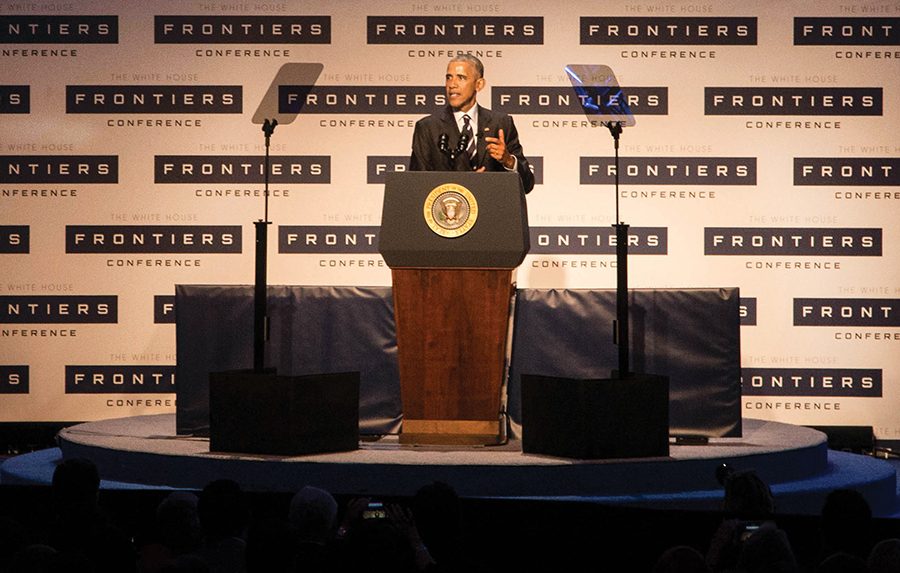President Obama, White House host science, technology conference at CMU
October 18, 2016
President Barack Obama spent one of the days of his last few months in office visiting Carnegie Mellon University (CMU) with some of the nation’s most notable inventors, scientists and engineers on Thursday, Oct. 13.
The University of Pittsburgh (Pitt) and CMU co-hosted the White House Frontiers Conference, an event to showcase scientific advancements, with the president.
“The future is yours, it’s all of ours, and we’ve got a tremendous group here from all across America,” Obama said.
The Frontiers conference had six different tracks – plenary, personal, local, national, global and interplanetary. Obama spoke on the plenary track, regarding the future of medicine and health care. The event was invite only.
“Innovation is in our DNA. Science has always been central to our progress,” Obama said.
Each track had its own panel with prominent inventors, scientists, engineers, university professors and other industry leaders, along with interactive stations with participants from each of the tracks.
Pitt and CMU students were among the people assisting with user experiences.
Jacqueline Young, senior at CMU, is part of her university’s “Articulab,” a group that studies human communication and how to improve it through technology.
This group is within the Human Computer Interaction Institute in the School of Computer Science at CMU.
At her station, Young assisted with the user experience of the Socially Aware Robot Assistant (SARA); the purpose of SARA is to create stronger human bonds in conversation.
The robot has conversations with users and interprets the conversation through facial expressions, tone of voice and other movements, all through computer technology and a small camera.
“When we start looking toward the future, we can definitely have different ways of communication and knowledge passed around, and we wouldn’t necessarily have to wait for the knowledge to come to us,” said Young.
Young said technology like SARA would be used in classrooms, homes or on the streets for directions.
“The context can be endless. Having a socially aware robot assistant is a platform in which we can cultivate a good level of interpersonal connection with the user and essentially pass on more information at a quicker pace,” said Young.
Andrea Sundaram, two years into completing his Ph.D. in rehabilitation science at Pitt, is in a wheelchair from a horseback riding accident. He exhibited some of the technologies that he and his peers are developing at the Human Engineering Research Laboratories on campus.
“Our goal in the lab is to make technology that works for people with disabilities to reduce barriers in their lives so they have fuller participation,” Sundaram said.
Sundaram wants to help the lives of disabled people and is working on Pitt’s development of the “Mobility Enhancement Robotic Wheelchair,” which has the ultimate goal of being a wheelchair that can tackle curbs and climb stairs.
“[Innovation] is that thing that sets us apart,” Obama said. “That ability to imagine and hypothesize and then test and figure stuff out and tinker and make things, and make them better. And then break them down and rework them.”
It was inventions like Sundaram’s that excited the president.
“I’m a science geek,” Obama said. “I’m a nerd, and I don’t make any apologies for it.”


















